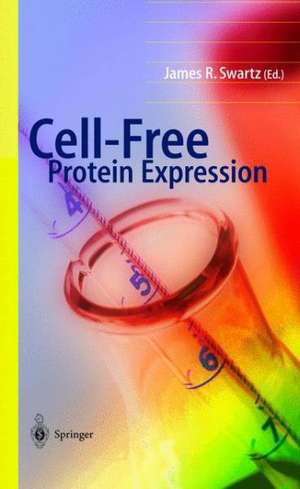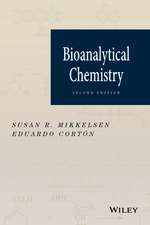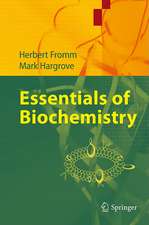Cell-Free Protein Expression
Editat de James R. Swartzen Limba Engleză Paperback – 19 sep 2011
Preț: 637.46 lei
Preț vechi: 749.95 lei
-15% Nou
Puncte Express: 956
Preț estimativ în valută:
121.99€ • 126.89$ • 100.71£
121.99€ • 126.89$ • 100.71£
Carte tipărită la comandă
Livrare economică 14-28 aprilie
Preluare comenzi: 021 569.72.76
Specificații
ISBN-13: 9783642639395
ISBN-10: 3642639399
Pagini: 236
Ilustrații: X, 230 p. 40 illus. in color.
Dimensiuni: 155 x 235 x 12 mm
Greutate: 0.34 kg
Ediția:Softcover reprint of the original 1st ed. 2003
Editura: Springer Berlin, Heidelberg
Colecția Springer
Locul publicării:Berlin, Heidelberg, Germany
ISBN-10: 3642639399
Pagini: 236
Ilustrații: X, 230 p. 40 illus. in color.
Dimensiuni: 155 x 235 x 12 mm
Greutate: 0.34 kg
Ediția:Softcover reprint of the original 1st ed. 2003
Editura: Springer Berlin, Heidelberg
Colecția Springer
Locul publicării:Berlin, Heidelberg, Germany
Public țintă
ResearchCuprins
I Template Generation for Cell-Free Protein Expression Systems.- 1 Generation of Linear Expression Elements by PCR.- 2 Rapid Protein Engineering by Expression-PCR.- 3 Expression-PCR: from Gene Pools to Purified Proteins Within 1 Day.- 4 High-Throughput Expression PCR Used to Systematically Investigate Regulation of Translation Initiation in an E. coli Cell-Free Expression System.- 5 Reduction of Primer-Dimer Formation during Generation of Expression Fragments by PCR.- II Labeling Proteins in Cell-Free Protein Expression Systems for Structural and Functional Analysis.- 6 Isotope Labeling of Proteins for NMR Spectroscopy Using Cell-Free Methods.- 7 Production of a Specifically Labeled Protein in mg Quantities for NMR Analysis.- 8 In Situ Mono-Biotinylation of Cell-Free Expressed Proteins Using the AviTag Technology.- 9 Rapid Generation of Protein Variants and Subsequent Analysis by Surface Plasmon Resonace.- 10 Incorporation of Fluorescence Labels into Cell-Free Produced Proteins.- 11 Expression of ‘Tailor-Made’ Proteins via Incorporation of Synthetic Amino Acids by Using Cell-Free Protein Synthesis.- III Screening and Increasing Soluble Expression of Recombinant Proteins.- 12 Application of Cell-free Expression Systems to Proteomic Studies.- 13 Screening and Increasing Soluble Expression of Recombinant Proteins using the RTS 100 E. coli HY in a 96-Well Format.- 14 In Vitro Expression of Proteins with Disulfide Bridges and its Application for a High-Throughput Screening System.- 15 Cell-Free Expression of Proteins Containing Multiple Disulfide Bonds.- 16 Cell-Free Synthesis of Membrane Proteins on a Preparative Scale.- IV Expression of Functionally Active Proteins and Complexes.- 17 Using Maltose-Binding Protein Fragment Complementation to Probe Protein-ProteinInteractions by Co Expression in the RTS System.- 18 In Vitro Translation of KRAB Zinc Finger Transcriptional Repressor Proteins and Their Interaction with Their TIF1? Co-Repressor.- 19 Optimization of Cell-Free Expression of FAD-Dependent D-Amino Acid Oxidase.- 20 Expression of Recombinant Chemokine-Like Factor 1 with a Cell-Free Protein Biosynthesis System.- 21 Recombinant Expression of Functional Active MIA (Melanoma Inhibitory Activity) Protein for Mutation Analysis Using the RTS System.- 22 Cell-Free Expression of the Heterodimeric Protein Penicillin G Amidase in a Functionally Active Form.- 23 Cell-Free Expression of the His-Tagged Recombinant Prolactin-Like Placenta Protein E Using the RTS 500 System.- V Eukaryotic Cell-Free Protein Expressions Systems.- 24 Complementary Interaction Between the Central Domain of 18S rRNA and the 5’ Untranslated Region of mRNA Enhances Translation Efficiency in Plants.- 25 In Vitro Translation in an Insect-Based Cell-Free System.
Textul de pe ultima copertă
Cell-free protein synthesis is coming of age! Motivated by an
escalating need for efficient protein synthesis and empowered by
readily accessible cell-free protein synthesis kits, the technology
is expanding both in the range of feasible proteins and in the ways
that proteins can be labeled and modified. This volume follows
"Cell-Free Translation Systems", edited by Professor Alexander S.
Spirin in 2002.
Since then, an impressive collection of new work has emerged that demonstrates a substantial expansion of capability.
In this volume, we show that proteins now can be efficiently produced using PCR products as DNA
templates and that even membrane proteins and proteins with multiple
disulfide proteins are obtained at high yields. Many additional
advances are also presented. It is an exciting time for protein
synthesis technology.









